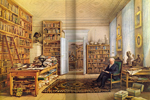| Meeting 20 • 15 March 2012 • Thursday |
Version: |
|
pictures of the week |
thought-bite of the week: |
|
|
"Gold dug out from the ground has, in the people's eyes, a special lure unrelated to the diligent farmer harvesting a fertile land under a gentle climate." |
|
mini-text of the week: "'…What an odd experience it was to find ourselves in these vast solitudes with a man who believed he was European, with all the vain pretensions, hereditary prejudices and mistakes of civilization, but whose only roof was a tree.'" Humboldt, "Personal Narrative", from Jaguars and Electric Eels, ed. & trans. Wilson, pp. 71 (read more) |
|
(X') = anticipated time in minutes (total=75) |
(0001) etc.=item in Humboldt Project document collection |
|
Key to notes added AFTER the class meets: |
|
|
√ = topic / activity that was adequately dealt with during the class |
+ = topic that was started but needs more attention & will be resumed at next / subsequent meeting(s) |
|
- = a topic / activity that was proposed though not begun, but will be taken up later |
|
|
Italic bold green text like this = comments after the meeting |
|
|
(5') Thought-bite of the week: Have you ever tried to become part of another culture, society, class, or ethnic group? Why? Did it work? The Bennett culture scale. |
|
|
(10') A last look at data-gathering: instruments then and now, using (1) the picture of AvH and AB with their instruments that we first saw in meeting 5, and (2) whatever chunks of the 1945 aviation sextant are back together and working One last shot at Humboldtian math, with last meeting's math challenge: how accurate is the "Theodolite" app? But first: How long is 1/10,000 of a degree of latitude? in feet? in meters? I'm applying for another Inquiry training grant: improving quantitative learning in the next version of the Humboldt SINQ. If time: Value of hands-on learning - a demonstration for math: Why, indeed, is the area of a circle calculated by squaring its radius and multiplying that by pi? |
|
|
(10') Contact of cultures, class of civilizations: The mini-text of the week (see above): The target(s) of Humboldt's sarcasm. What did he criticize about which groups of people? To what extent did he stereotype or not stereotype people? Cultural sustainability: you can get an MA in it, from Goucher College; sample issues: Did Elvis merely exploit, or even harm, black American music? gospel music? What about those French people who do so much jazz? Or that strange hybrid, German country-western music? |
|
|
(15') More about John Wesley Powell, "beyond the 100th meridian", settlement of the American West, Oregon, and water/land use. The three E's of sustainability. What does "interconnectedness" mean to you now? See Stegner, Wallace, Beyond the Hundredth Meridian, 1953; rpt. Penguin, 1992, and Worster, Donald, A River Running West: The Life of John Wesley Powell, Oxford UP, 2001. Basic biographical sources: Wikipedia; PBS "American Experience" (Powell & Bureau of Ethnology); Powell Museum at Lake Powell ("Explore with Us") |
|
|
|
(15') Humboldt's later life and legacy ("Going [back] Home") - a good way to wrap up this course and prepare for the final: 1) Cosmos & Cosmos - more than half a century at the center of European intellectual life; 2) Humboldt the political activist: from the French Revolution (was it worth it?? what would be its modern American equivalent and cost??) through the 1848 European rebellions to the lead-up to the American Civil War; the German '48ers in the US. |
|
(15') Finishing up: 1) Due dates and how to turn stuff in. 2) Final exam (Thursday, 22 March, 1530-1720 in our classroom). Parts: group project scoring guide; factual writing about Humboldt and his work (practice today in groups: construct a fast FAQ); reflection - how have you thought about what you've encountered in the course; response to reading about exploration and sustainable environmentalism in our time - how well can you interpret the present by interpreting the past? How to prepare before the exam: (re!)read the Helferich biography and Jaguars and Electric Eels; REVIEW THE COURSE MEETING PAGES linked from the SCHEDULE page. |
|
|
(5') Checkups & last bits My lunch / coffee / snack offer (Friday or whenever) still stands, even after the course is over (email me) I'm looking for people to join me at the "Planet under Pressure" (29 March) and "PSU Earth Day" (22 April, I think) events. For each of those events I will buy lunch and coffee / snack for up to two people, and (résumé builder) will write them a detailed, signed thank-you letter on PSU stationery. So email me. We didn't do the "Myself as Humboldt" photo and description. If we have time today, we'll tell each other what that would have looked like. Scoring guide for Species Description is now ready. Job / internship / volunteer opportunities: Sauvie Island Center , spring (with credit if arranged) Youth Leaders for Sustainability (various skills needed) |

